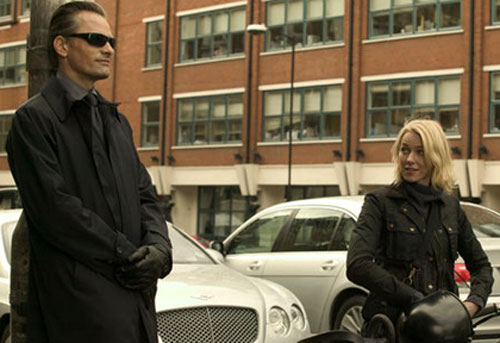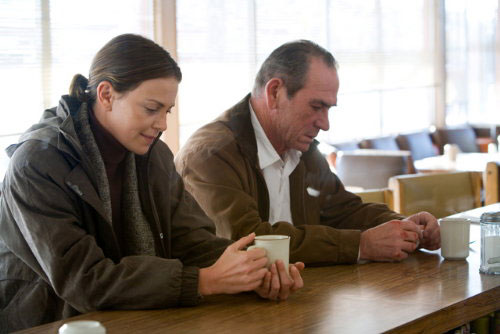|
Anybody who's ever watched The Sopranos or Law & Order knows of the existence of the Russian Mafia, but it's doubtful many Americans know much more about it than the thugs Jack McCoy prosecuted or Paulie and Christopher chased through the New Jersey pine barrens. What little I know beyond that came from a book I leafed through once about the system of tattoos for Russian mobsters and criminals. The book was so disturbing that I put it down after about thirty seconds, but it stayed, unbidden, in my memory.
Director David Cronenberg and screenwriter Steve Knight have now obliged the public with Eastern Promises, a film disturbing in so many ways that the tattoos are the least of it. Eastern Promises doesn't explain the complex system of tattoos, or how it got started. It does tell us, however, that a Russian mobster's tattoos tell his entire career history—who he's worked for, what prisons he's been in, what crimes he's committed. We also learn that stars tattooed on the knees means you kneel to no one, and a star over the heart means you're a made man. But being a made man doesn't exempt you from bloody reprisals, as Eastern Promises makes abundantly, excruciatingly clear.
Photographed in dark, insinuating colors by the brilliant Peter Suschitzky, Eastern Promises marinates us in vats of gore from the beginning. The first scene shows an elegantly dressed Russian getting his throat cut in a London barber shop. The second shows a pregnant Russian teenager, barefoot and in a nightgown, going into bloody labor in a pharmacy. (Those who know Cronenberg's work will know beforehand that Cronenberg spares us nothing in either scene.) The girl dies giving birth to a daughter, and Anna (Naomi Watts), the midwife who attended the birth, is determined to find the mother's family. The only clues Anna has are the mother's diary, written in Russian—which she cannot read, although her father was Russian—and a card from an elegant Central London restaurant, the Trans-Siberian. At the Trans-Siberian, Anna meets an unlovely trio: Semyon (Armin Mueller-Stahl), the restaurant's owner, whose bland, benign manner scarcely masks the Stalinesque coldness in his eyes; Kirill (Vincent Cassel), Semyon's crude, bullying son; and Nikolai (Viggo Mortensen), Semyon and Kirill's enigmatic chauffeur, who also performs various duties Semyon and Kirill prefer not to soil their hands with.
The gangsters' connection with both the opening murder and the dead girl, and Anna's reluctant immersion in their world, comprise the story of Eastern Promises. Anna's comprehension of that world is as murky as ours, despite her Russian roots and her drunken uncle (Jerzy Skolimowski) who boasts constantly (and possibly spuriously) of his days in the KGB. Unfortunately, despite the many juicy scenes of violence, the breathtaking suspense toward the end and the undeniable excellence of the performances, dialogue and direction, the picture of the Russian mob that we get remains unsatisfying.
A good part of the problem is that Nikolai turns out to be our de facto guide to that world, and because he remains unreadable, so does the film. Nikolai is at the center of nearly all the film's major set pieces, including the already-famous naked knife fight that sets a high-water mark for screen brutality, even for Cronenberg. In Eastern Promises as in Cronenberg's previous and better film, A History of Violence, Mortensen shows himself a master at playing enigmatic loners, compelling our attention even when standing absolutely still.

He is an actor who can speak volumes with his eyes, and several unspoken yet electric exchanges pass between him and the similarly expressive Watts. But expressiveness can't make up for every deficiency in the script, and even a major plot twist near the end, which is supposed to explain Nikolai's true place in the story, only raises more questions. I had the same problem with Eastern Promises that I did with the Coen Brothers' Miller's Crossing, another movie about a criminal subculture with a hermetically sealed lead character (played by Gabriel Byrne in that instance). Nevertheless, even minor Cronenberg is a must-see for audiences with sufficiently strong stomachs, and Eastern Promises offers pleasures that are simultaneously intelligent and lurid.
The relationship between Nikolai and Anna never gets anywhere near romance, despite their silent mutual attraction; the gulf between them is just too great. Another recently released film—Paul Haggis' In the Valley of Elah—never even considers the possibility of an attraction between its protagonists, retired military policeman Hank Deerfield (Tommy Lee Jones) and police detective Emily Sanders (Charlize Theron). The script by Haggis (based on a magazine article by Mark Boal) provides plenty of reasons for this. Hank is twice Emily's age, not traditionally a barrier to romance in the movies, but he's also a happily married man of many years' standing. Basically, however, Hank and Emily are just too good at being cops. They're both too intent on the matter at hand—solving the disappearance of Hank's son Mike (Jonathan Tucker), a combat soldier recently returned from Iraq—and they're both too hard-nosed to keep from getting on each other's nerves.

Hank is as regular Army as they come, even to the point of making his motel bed every morning, with crisp military corners the maid couldn't hope to match. Emily, meanwhile, is beleaguered at work with the crude, sexist attitudes of her fellow detectives and at home by the pressures of being a single mom to a small son. Hank and Emily get in each other's way constantly, showing up at the same seedy topless bars and fried chicken restaurants where Mike was last seen with his buddies. Emily fumes that Hank is interfering with her investigation, and Hank finds Emily and her police colleagues less than helpful. At one point when Hank thanks Emily for a favor, she says, "It was the least I could do." After a pause, Hank replies, "I'd say that's accurate."
Hank withholds a little information of his own, namely that he palmed his son's cell phone. Its workings were fried by the desert sun, but a friendly techie retrieves some garbled images which present a disturbing picture of the war that even Hank, a Vietnam vet, didn't expect. Meanwhile, Hank becomes sufficiently friendly with Emily that she invites him home to dinner. He entrances her little boy by telling him the Biblical story of how the evil giant Goliath taunted the Israelite army for forty days in the valley of Elah, until the frail, innocent boy David stepped forward with his slingshot and killed the giant with one stone to the forehead.
Then the charred remains of a human corpse are found in a field near the military base…
In an open letter to critics and viewers, Haggis said we all know about David and Goliath in the valley of Elah, but what about the other soldiers who where there? And, by extension, what do we really know about the front-line soldiers in Iraq, what they feel and how their combat experiences are affecting them? Some critics have said In the Valley of Elah could be about combat soldiers in any war, but I disagree. Haggis, it seems to me, is arguing that the circumstances of American soldiers in Iraq are proving uniquely debilitating, mentally and spiritually, and are warping them in ways unknown in any previous war. How else can you explain that Hank, who has made the Army's system of justice his life, follows assumptions about the way soldiers think and act that turn out to be completely, tragically wrong? (Hank isn't the only one who's flummoxed. A criminal complaint that Emily dismisses as trivial early in the film comes back to haunt her, hideously, toward the end. The film doesn't belabor the point, but we see that a soldier, presumably an Iraq veteran, is the perpetrator.)
In Hollywood, Paul Haggis is as polarizing as Hillary Clinton is in Washington. He is criticized constantly as blatant, heavy-handed, a dealer in hoary liberal clichés and silly coincidence. The Best Picture Oscar for Crash, Haggis' debut film as director, was followed by some of the loudest demonstrations of buyers' remorse in the Academy's history. Personally, I loved Crash, with its superb ensemble cast and its almost Dickensian intensity in depicting our nation's festering racial divides. I was less fond of Haggis' screenplay for Million Dollar Baby, which basically grafted one old Hollywood story onto another, though Clint Eastwood's direction and the performances of Eastwood, Hilary Swank and Morgan Freeman went a long way toward putting it across.
As for In the Valley of Elah, a viewer might quarrel with Haggis' thesis, but not with his abilities in writing dialogue, building suspense, or creating a mood of real tragedy. I think of Haggis as a director who works in bold primary colors, but who is smart enough to cast actors who work in the most delicate, nuanced shades. This is certainly true of Tommy Lee Jones, whose performance as Hank may be his finest ever. If Viggo Mortensen can suggest unplumbed depths with his eyes, Jones can radiate a universe of deep and complex emotions, even as his eyes are as unreadable as the rest of him. Only Spencer Tracy was as mysterious in his acting processes as Jones, but Jones is even more of a minimalist than Tracy. Charlize Theron—dressed and coiffed plainly, but not harshly deglamorized as she was in Monster—is very nearly Jones' equal as Emily, a smart and tenacious cop whose cross to bear is a constant questioning of her dedication to the job, simply because of her gender.
All of the other roles are much smaller, but sharply etched. Susan Sarandon has barely more than a cameo as Hank's wife, but she makes it count. Jason Patric does solid work as an Army investigator, as do such welcome old hands as Frances Fisher, Josh Brolin and Barry Corbin in roles of only a few minutes' duration. Also impressive are the young actors who play Mike Deerfield's buddies; at least one of them, Jake McLaughlin, is an Iraq veteran himself.
In the Valley of Elah doesn't marinate us in scenes of bloody violence as does Eastern Promises, but the fragments of action it shows us from Mike's cell phone suggest hellish bloodshed far beyond anything in Cronenberg's film. So does the autopsy of the charred, dismembered corpse, which might induce queasiness even in fans of CSI and Court TV. As Haggis strongly suggests, it will be many years before we see the worst about Iraq.
|
|
